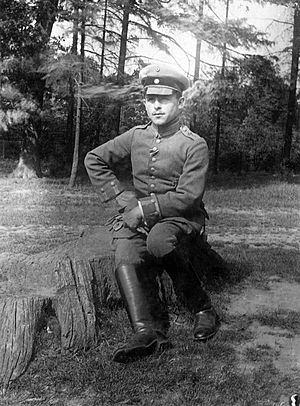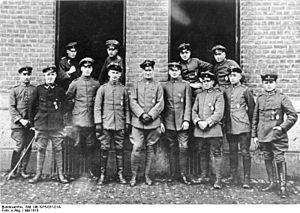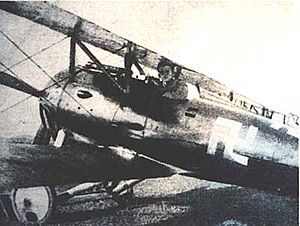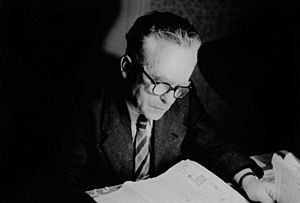Fritz Beckhardt facts for kids
Quick facts for kids
Fritz Beckhardt
|
|
|---|---|

Fritz Beckhardt as a fighter pilot in 1918
|
|
| Born | 27 March 1889 Wallertheim, Rheinhessen, Germany |
| Died | 13 January 1962 (aged 72) Wiesbaden, West Germany |
| Allegiance | |
| Service/ |
Infantry, Air Service |
| Years of service | 1907–1909, 1914–1919 |
| Rank | Vizefeldwebel |
| Awards | Iron Cross, Royal House Order of Hohenzollern |
Fritz Beckhardt (born March 27, 1889 – died January 13, 1962) was a brave German Jewish pilot during World War I. He was known as a "fighter ace" because he shot down 17 enemy planes. His amazing war record showed how courageous he was. Later, the Nazis tried to hide his story because it proved their false ideas about Jewish people were wrong.
Contents
Early Life and Military Start
Fritz Beckhardt was born in Wallertheim, a town in Germany. His father's name was Abraham Beckhardt.
Before World War I, Fritz worked in different stores. He learned about groceries and menswear. He also served in the army as an infantry soldier from 1907 to 1909.
In 1914, he was working in France. When the war started, he returned to Germany. He volunteered to join the infantry again. He served there until 1916. During this time, he earned two Iron Cross medals for his bravery.
Becoming a Fighter Pilot
In January 1917, Fritz Beckhardt began training to become a pilot. After his training, he flew long missions to gather information. He then trained to become a fighter pilot.
From February to May 1918, he joined a fighter squadron called Jagdstaffel 26, also known as Jasta 26. Another famous pilot, Hermann Göring, was also in this squadron. Beckhardt and Göring knew each other well.
Fritz Beckhardt got his first confirmed victory on April 11, 1918. He shot down a British plane called a Royal Aircraft Factory R.E.8.
Interestingly, Beckhardt's personal symbol on his planes was a Swastika. At that time, the swastika was not a Nazi symbol. His swastika also pointed in the opposite direction from the Nazi one.
When World War I ended on November 11, 1918, Beckhardt did not want to give up his fighter plane. Two days later, he flew his Siemens-Schuckert D.III plane into Switzerland. He stayed there until 1919.
By the end of the war, Beckhardt was part of a group called the League of Jewish Soldiers at the Front. He was one of only three German Jewish soldiers to receive the House Order of Hohenzollern. This was a very high award. The German Emperor Wilhelm II personally congratulated him twice for his success as a pilot.
Life Between the World Wars
In 1926, Fritz Beckhardt married Rosa Emma Neumann in Germany. He then took over his father-in-law's grocery store.
When the Nazis started to boycott (avoid) Jewish businesses in 1933, Beckhardt moved his store. He opened a new business in the center of Wiesbaden that sold oils and fats.
In 1936, he helped two Jewish brothers escape from the Gestapo, the Nazi secret police. He drove them to the Belgian border. These brothers later opened a kosher butcher shop in London.
Because of the Nazi government's persecution, Fritz Beckhardt was imprisoned in 1937. He was sent to Buchenwald concentration camp in 1939. Even the prison records noted his 17 victories as a fighter pilot from World War I.
World War II and Later Life
It is believed that Hermann Göring helped Beckhardt get released from the camp. Göring remembered their time together as pilots. Beckhardt's lawyer, Berthold Guthmann, had also served with both of them in World War I. Sadly, Guthmann, who was Jewish, died in a Nazi camp later.
Fritz and Rosa Emma Beckhardt managed to escape to Portugal. From there, they went to England. After a short stay on the Isle of Man, they reunited with their two children, Kurt and Sue Hilde. Their children had been brought to England by the "Kindertransport" organizations, which helped Jewish children escape the Nazis.
In 1950, Fritz Beckhardt returned to Wiesbaden, Germany. He got his house and shop back through legal action. He and his son Kurt then opened the first self-serve grocery store in Wiesbaden. Fritz Beckhardt ran the store until he passed away on January 13, 1962. He and his wife are buried in the Jewish cemetery in Wiesbaden.
His son, Kurt, later lived in Bonn, Germany. His daughter, Suse Hilde, became a British citizen and lived in London.
Fritz Beckhardt's son, Kurt, did not tell his own son, Lorenz, about their Jewish background for many years. He wanted to protect Lorenz from the kind of persecution they had faced. Lorenz found out when he was 18. He then researched his grandfather's story. This led to a book called Der Jude mit dem Hakenkreuz. Meine deutsche Familie (The Jew with the Swastika. My German Family), which is about Fritz Beckhardt.
Awards and Honors
Fritz Beckhardt received many awards for his bravery and service:
- Member of the Royal House Order of Hohenzollern with Swords
- General Honour Decoration for Bravery (from the Grand Duchy of Hesse)
- Iron Cross (1914), 1st and 2nd class
- Bravery Medal (Hesse) (from the Grand Duchy of Hesse)
- Military Merit Order, 3rd class (from Bavaria)
- War Merit Cross (from Baden)
- Black Wound Badge (1918)
- Field Honour Badge (from Hamburg)
- Honour Cross of the World War 1914/1918
- Warrior Medal in Iron
- Prussian military pilot badge
- Honour Cup for the winner in a dogfight
 | Laphonza Butler |
 | Daisy Bates |
 | Elizabeth Piper Ensley |




